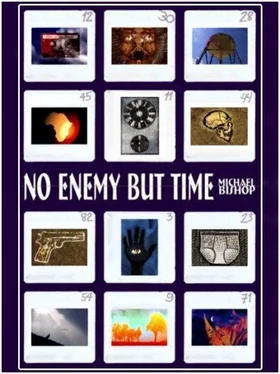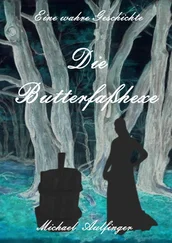“I thought that would be part of proving my manhood.”
“No. Rather than being required, it’s prohibited.”
“Thanks be to Ngai for small mercies.”
Naked and shivering, he entered the clearing beneath the tree house, sat down on the matted grass, and averted his face from the ladder that Babington would soon be descending. Blair, his aide, could offer him no physical assistance until the rite was concluded.
The songs of the Kikembu women, the bawdy masculine repartee at his back, and the anxious hiccupping of his heart isolated him from the reality of what was happening. This was not happening to him. Only, of course, it was.
Then Babington was there, kneeling before him with a knife, and Joshua put both fists to the right side of his neck, placed his chin on one fist, and stared out into the savannah. The cutting began. Joshua clenched his teeth and tightened his fists. Doggedly refusing to yip or whimper, he caught sight of a pair of tourist minibuses rolling over the steppe from the vicinity of the guest lodge. That morning while boarding the Land Rover, he recalled, he had seen them parked inside a courtyard next to the lodge. Somehow the tour guide had learned of the approaching ceremony. When the minibuses pulled abreast of the acacia grove, clouds of dust drifting away behind them, Joshua wanted to scream.
The faces in the windows of the two grimy vehicles belonged primarily to astonished Caucasians, many of them elderly women in multicolored head scarves, out-of-fashion pillbox hats, or luxuriant wigs much too youthful for their wearers. The cutting momentarily ceased. Passengers from both vans dismounted at the outer picket of trees and filtered inward to stand behind the swaying and ululating Kikembu women.
“Jesus,” Joshua murmured.
“Hush,” cautioned Babington. “Or I will deprive you of much future pleasure and many descendants.”
A portly, middle-aged tour guide with a florid complexion used a megaphone to make himself heard over the singing and hand-clapping Africans.
The cutting had begun again. Joshua shut out the man’s spiel to concentrate on the waves of pain radiating through him from the focus of the knife.
The eyes of the female tourist nearest the guide, Joshua noticed, had grown huge behind her thick-lensed glasses. She was a stout ruin of a woman whose magenta head scarf resembled a babushka. Her body appeared to sway in time with those of the svelte, graceful Africans. Her swaying and the guide’s ceaseless patter distracted Joshua from the pain of the circumcision rite.
“Finished,” Babington announced.
“Don’t leave Ngwati ,” Blair countered. “Remove it, please.”
Babington snorted his contempt for this command, but swiftly removed the offending string of flesh.
In celebration of the successful irua , a chorus of voices echoed through the grove and across the steppe. Now Joshua could look down. He saw blood flowing from him into the grass like water from a spigot. Blair steadied him from behind and wrapped the immaculate white robe around his shoulders.
Now people were dancing as well as singing, extolling the initiate’s courage as they wove in and out among the trees in a sinuous daisy chain of bodies. Some of the tourists had joined the conga line, and the two groups, Africans and foreigners, were suddenly beginning to blend. The Kikembu waved their arms in encouragement, and more tourists—sheepish old white people—snaked their way into the celebration.
Joshua, afraid he would faint, held the front of his robe away from his groin to keep from staining the garment. The woman with the magenta scarf approached him from the edge of the grove and addressed him in the flat, Alf Landon accents of a native Kansan.
“I’ll give you twenty dollars for that robe.”
Joshua gaped.
“Tell him twenty dollars for the robe,” the old woman commanded Blair. “Another five if he’ll let me take a Polaroid. Our tour guide said to ask before I took a Polaroid.”
“Mrs. Givens!” Joshua exclaimed. “Kit Givens from Van Luna, Kansas!” He had last seen the old woman at his grandfather’s funeral fourteen years ago, piously occupying a rear pew in the stained-glass, apricot-and-umber ambiance of the First Methodist Church. She was seventy-two if she was a minute.
Her withered cheeks and chin were tinted all the iridescent colors of a mandrill’s mask.
“I’ve never seen him before,” Mrs. Givens told Blair, as if sharing a confidence. “I don’t know how he could know my name.”
“You pulled my hair in my grandfather’s grocery when I was a baby.”
The old woman rallied. “You’re an impudent little nigger. I wouldn’t pay you five dollars to mow my yard.”
Defiant despite his weakness, Joshua doffed his robe and handed it to Mrs. Givens. “Here. I want you to have this. Take it back to Van Luna—the sooner the better.”
Mrs. Givens took the robe from the bleeding man, backed away from him clutching it, and turned again to the paleoanthropologist. “You’ll walk me back to the tour bus, please. I’ve never met this man in my life.”
“Of course, Mrs. Givens.”
As Blair directed the old woman through the rowdy throng to the bus, Babington helped Joshua climb the ladder into the tree house. Many of the Kikembu from Nyarati had brought banana leaves to the ceremony, and the old Wanderobo had already arranged the leaves into a pallet upon which Joshua could rest without fear of exacerbating his wounds. His penis would not stick to the banana leaves as to linen or other sorts of bedding, and the wounds would therefore heal more readily.
Lying on this pallet, Joshua saw Babington’s creased face staring down at him. A face that seemed to have been created in the same way that wind sculpts sand dunes or rain erodes channels into the hardest rock.
“Everyone wants a piece of the sacred,” Joshua whispered. “Even if it isn’t sacred. Dreaming makes it so, and the dreaming goes on and on until it’s a habit.”
“Go to sleep, Joshua,” the old man said.
* * *
Three weeks passed before Joshua felt strong enough to resume his survival training. For two nights, despite the antibiotics that Blair had brought to Lolitabu from the hospital at Russell-Tharaka Air Force Base, he was delirious. In his delirium he was visited by the lacerated ghost of his adoptive father, as well as a gnomish Spanish woman who opened her blouse and let him nurse like a baby, a young black infantryman with no head, and the robed figure of Mutesa David Christian Ghazali Tharaka, President of Zarakal. This last visitor, Joshua learned from Babington, had actually been there.
“Why was he here? What did he say?”
Babington handed Joshua an autographed picture of the President. “He said he was very proud of you.
You are bridging a chasm between Zarakal’s pluralistic tribal beginnings and its modern aspirations. That you, an American black man, submitted to the knife bespeaks the fullness of your commitment to our dream.”
“What else did he say?”
“He gave me a photograph, too.” Babington pointed at the wall of the tree house, where he had hung another copy of the same photograph. This one bore an inscription to the Wanderobo. Joshua could not see it from where he lay, but he could tell that it had made Babington very happy.
At first it disturbed Joshua that he was taking so long to heal, but Babington explained that he himself had suffered intense pain and then a throbbing tenderness for well over a month after his irua . By mid-October, just as his mentor had predicted, they were stalking game again, digging tubers, picking fruit, and diving ever deeper into wilderness lore. Joshua’s glans was no longer so sensitive that simply to urinate was to conduct electricity. He was himself again.
Читать дальше



![Ally Carter - [Gallagher Girls 01] I'd Tell You I Love You But Then I'd Have to Kill You](/books/262179/ally-carter-gallagher-girls-01-i-d-tell-you-i-lo-thumb.webp)








